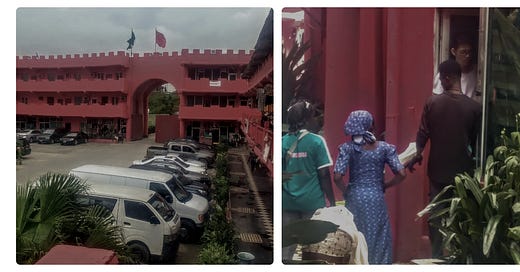Criminal syndicates in Africa and Asia are working together — and competing — to meet the seemingly insatiable demand for pangolins in China and other markets. Over the last nine months, over 30 journalists across 14 countries and territories investigated how illegal pangolin trafficking is leading the species to become extinct.
Today, we’re sending you our dispatch from Nigeria.
You can find our global report here:
The Chinatown in Lagos, has bright red walls painted to resemble the Great Wall, and fluttering Nigerian and Chinese flags. Above the entrance are Chinese characters 中国商城, or “China Business City.”
Chinese-run shops sell everything from clothes to books to machinery. And some suspect, even pangolins.
“I have strong reasons to suspect that some of the scales may be stored there before they are shipped overseas,” said Olajumoke Morenikeji, an environmental biologist and professor at the University of Ibadan.
Morenikeji, former director of the University of Ibadan Zoological Garden, has studied for years how Chinese traders have taken over the market for pangolins because they pay higher prices than their local competitors.

The entrance to China Business City, the Chinatown in Lagos, where predominantly Chinese-run businesses are frequented by both locals and Chinese nationals. Credit: Samuel Ogundipe / Premium Times
She said that local hunters are offered between 5,000 and 10,000 Nigerian naira for a pangolin, or about $14-$28. “That is a lot of money in Nigeria,” she said, adding that local traders are mostly unaware that middlemen profit many times more by exporting it to China.
“The hunters go into the bushes or forests to hunt, usually overnight, and sell to middlemen who know how to get them to the urban markets,” she said. “It is from the urban markets that the Chinese hijack the product by out-negotiating the locals.”
There have been cases in which Chinese traders also go into remote villages in search of the product themselves, she said, referring to an unexpected encounter with a middleman in the nearby town of Ikire.
From Nigeria, the pangolin scales are being smuggled out to China, often via shipping containers that are falsely labelled, leading to large seizures in Singapore and Vietnam earlier this year.
In another recent case, about 120 kilograms of scales were found hidden inside damaged machinery en route to Antwerp, Belgium, according to a local official who was not authorised to speak on the record.
We asked the Nigeria Customs Service about their seizures of pangolin scales. In 2018, they confiscated 6.2 tons of elephant tusks and pangolin scales in 10 busts. Between January and June this year, they seized 667 kilograms of tusks and pangolin scales. They did not provide separate figures.
“Roughly 50 tonnes of illegal African pangolin scales have been seized globally in the last four months,” estimated Peter Knights, the CEO of WildAid, an advocacy group. “In shipments that contain both pangolins and ivory, pangolin scales have now surpassed the volume of ivory.”

This woman we met at a market in Lagos is one of several traders openly selling pangolin scales there. Credit: Samuel Ogundipe / Premium Times
Interviews conducted at local bushmeat markets confirm that growing Chinese demand is displacing local traders. “The Chinco people have taken over the market and are paying high prices to take off all scales from the local market,” said one trader at Ketu Market in Lagos, referring to her Chinese competitors.
When we met her, she had about 1.5 kilograms of scales left in her store, with a selling price of 10,000 Nigerian naira. All the traders we talked to claimed they did not know it was illegal to trade pangolins in Nigeria. “Our forefathers have used pangolins and other wild animals to make medicine and heal people, and we’re not going to stop now,” she said.
“I have been in this business for many years,” said the woman at Ketu Market. “My daughter is now 23, and she was born into it, but I have never heard that it is illegal to sell animals that were caught in the bush.”
At Ijora Market, near the Lagos lagoon, many traders said they have run out of stock in recent months due to Chinese demand. They lamented that the scales no longer reach their markets, but went directly to Chinese buyers.
On Thursday, we’re hosting an AMA on Reddit, you’ll find us there at 10 pm Hong Kong time. That’s 4 pm in Berlin and 10 am in New York. Please follow us on Facebook or Twitter for updates. We will send a reminder with a link on Wednesday.
Next week, we’ll send you two dispatches from Malaysia. On Wednesday, you’ll meet indigenous hunters, and on Saturday, we shed light on corruption at the Malaysian-Thai border.
If you have questions or tips, or would like to get in touch with our reporters and editors, just respond to this email.
All text can be reshared and republished under the following Creative Commons license: Attribution-NonCommercial-NoDerivatives 4.0 International (CC BY-NC-ND 4.0).


